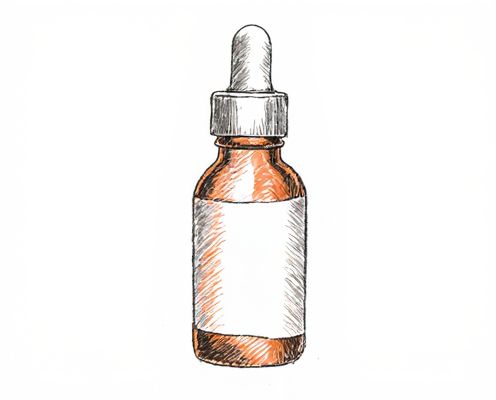
Microbiome serum Illustration
Microbiome serum is designed to restore and balance the skin's natural flora, promoting a healthy and radiant complexion. Enriched with prebiotics and probiotics, it supports the skin barrier, reduces inflammation, and enhances hydration. Frequent use helps protect against environmental stressors and improves overall skin resilience.
Introduction to Microbiome Serum in Cosmetics
Microbiome serum in cosmetics harnesses beneficial bacteria and prebiotics to restore and balance the skin's natural flora, promoting healthier skin barrier function and enhanced hydration. This innovative skincare product targets microbiome dysbiosis, reducing inflammation and improving skin resilience against environmental stressors. Formulated with active ingredients like probiotics, postbiotics, and botanical extracts, microbiome serums support long-term skin microbiota equilibrium, essential for maintaining youthful and radiant skin.
Understanding the Skin Microbiome
The skin microbiome consists of trillions of beneficial bacteria, fungi, and viruses that maintain skin health by protecting against harmful pathogens and balancing moisture levels. Microbiome serums are specifically formulated to nourish and support this ecosystem, enhancing the skin's natural barrier and reducing inflammation. Research shows that preserving the skin microbiome can improve conditions like acne, eczema, and sensitivity while promoting a radiant and resilient complexion.
How Microbiome Serums Work
Microbiome serums work by balancing and nurturing the skin's natural microbial ecosystem, promoting the growth of beneficial bacteria while inhibiting harmful pathogens. These formulations often contain prebiotics, probiotics, and postbiotics that support skin barrier function and enhance immunity. Incorporating such a serum into Your skincare routine can improve hydration, reduce inflammation, and help maintain a healthy, radiant complexion.
Key Ingredients in Microbiome Serums
Microbiome serums typically contain key ingredients such as prebiotics, probiotics, and postbiotics that work synergistically to balance and support your skin's natural microbiome. Ingredients like lactobacillus ferment, bifida ferment lysate, and inulin help to strengthen the skin barrier, reduce inflammation, and enhance hydration. Choosing a microbiome serum with these potent components can promote a healthier, more resilient complexion.
Benefits of Microbiome Serum for Skin Health
Microbiome serum enhances skin health by balancing the natural microbial flora, reducing inflammation, and strengthening the skin's barrier function. It promotes hydration, minimizes redness, and supports the skin's defense against environmental stressors. Regular use can lead to improved texture, increased resilience, and a clearer, more radiant complexion.
Microbiome Serum vs. Traditional Skin Serums
Microbiome serum harnesses the power of probiotics and prebiotics to balance and strengthen the skin's natural microbial ecosystem, promoting healthier and more resilient skin. Unlike traditional skin serums that primarily target surface concerns such as hydration or anti-aging with ingredients like hyaluronic acid or retinol, microbiome serums work from within to improve skin barrier function and reduce inflammation. This targeted approach helps maintain skin homeostasis, making microbiome serums particularly effective for sensitive or acne-prone skin types.
Choosing the Right Microbiome Serum for Women
Selecting the right microbiome serum for women involves understanding your skin type and specific needs, such as hydration, sensitivity, or anti-aging concerns. Look for serums enriched with prebiotics, probiotics, and postbiotics that promote a balanced skin microbiota while enhancing skin barrier function. Incorporating a microbiome serum tailored to your individual skin condition supports overall skin health and radiance.
Incorporating Microbiome Serum into Your Skincare Routine
Incorporating microbiome serum into your skincare routine helps balance the skin's natural flora, promoting a healthy barrier and reducing inflammation. These serums contain prebiotics, probiotics, and postbiotics that support the skin's microbiota, enhancing hydration and resilience against environmental stressors. Consistent use can improve skin texture and prevent common issues such as dryness, redness, and sensitivity by maintaining an optimal microbial balance.
Scientific Studies Supporting Microbiome Serums
Scientific studies have demonstrated that microbiome serums promote skin barrier repair by balancing the skin's natural flora and reducing inflammation. Research published in the Journal of Dermatological Science highlights that peptides and prebiotics in microbiome serums enhance microbial diversity, leading to improved skin hydration and resilience. Using these serums can support your skin's health by fostering a thriving, balanced microbiome essential for maintaining a radiant complexion.
Future Trends in Microbiome-Based Cosmetics
Microbiome serum technology is advancing rapidly, leveraging probiotics and prebiotics to enhance skin health by restoring the natural microbial balance. Cutting-edge research focuses on personalized formulas targeting individual microbiomes, promising more effective and sustainable skincare solutions. Integration of AI-driven diagnostics and biotechnological innovations will shape future microbiome-based cosmetics, offering tailored product recommendations and improved skin barrier protection.
 womendy.com
womendy.com